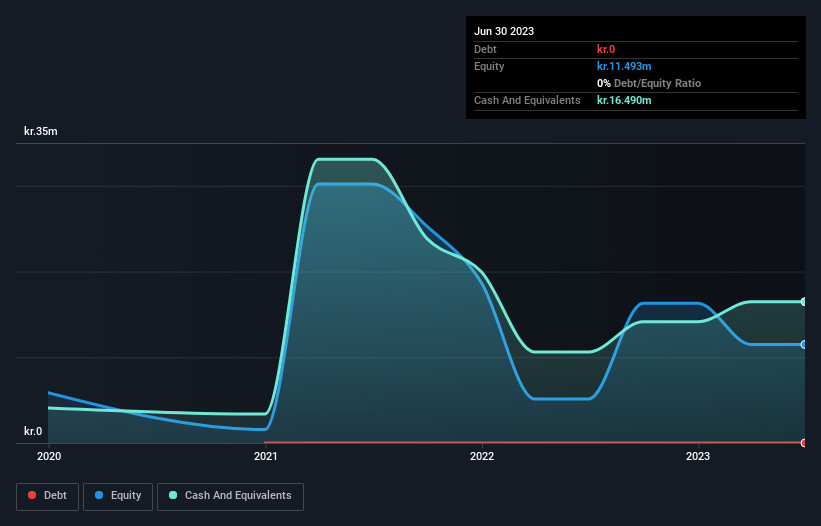We're Not Very Worried About RISMA Systems' (CPH:RISMA) Cash Burn Rate
We can readily understand why investors are attracted to unprofitable companies. For example, although software-as-a-service business Salesforce.com lost money for years while it grew recurring revenue, if you held shares since 2005, you'd have done very well indeed. But while history lauds those rare successes, those that fail are often forgotten; who remembers Pets.com?
Given this risk, we thought we'd take a look at whether RISMA Systems (CPH:RISMA) shareholders should be worried about its cash burn. For the purpose of this article, we'll define cash burn as the amount of cash the company is spending each year to fund its growth (also called its negative free cash flow). Let's start with an examination of the business' cash, relative to its cash burn.
View our latest analysis for RISMA Systems
When Might RISMA Systems Run Out Of Money?
A company's cash runway is calculated by dividing its cash hoard by its cash burn. In June 2023, RISMA Systems had kr.16m in cash, and was debt-free. Importantly, its cash burn was kr.14m over the trailing twelve months. So it had a cash runway of approximately 14 months from June 2023. That's not too bad, but it's fair to say the end of the cash runway is in sight, unless cash burn reduces drastically. Depicted below, you can see how its cash holdings have changed over time.

How Well Is RISMA Systems Growing?
It was fairly positive to see that RISMA Systems reduced its cash burn by 35% during the last year. And considering that its operating revenue gained 32% during that period, that's great to see. It seems to be growing nicely. In reality, this article only makes a short study of the company's growth data. This graph of historic revenue growth shows how RISMA Systems is building its business over time.
Can RISMA Systems Raise More Cash Easily?
While RISMA Systems seems to be in a fairly good position, it's still worth considering how easily it could raise more cash, even just to fuel faster growth. Issuing new shares, or taking on debt, are the most common ways for a listed company to raise more money for its business. Commonly, a business will sell new shares in itself to raise cash and drive growth. By looking at a company's cash burn relative to its market capitalisation, we gain insight on how much shareholders would be diluted if the company needed to raise enough cash to cover another year's cash burn.
RISMA Systems' cash burn of kr.14m is about 7.8% of its kr.184m market capitalisation. Given that is a rather small percentage, it would probably be really easy for the company to fund another year's growth by issuing some new shares to investors, or even by taking out a loan.
How Risky Is RISMA Systems' Cash Burn Situation?
RISMA Systems appears to be in pretty good health when it comes to its cash burn situation. One the one hand we have its solid cash burn relative to its market cap, while on the other it can also boast very strong revenue growth. Considering all the factors discussed in this article, we're not overly concerned about the company's cash burn, although we do think shareholders should keep an eye on how it develops. On another note, we conducted an in-depth investigation of the company, and identified 5 warning signs for RISMA Systems (1 is a bit unpleasant!) that you should be aware of before investing here.
Of course RISMA Systems may not be the best stock to buy. So you may wish to see this free collection of companies boasting high return on equity, or this list of stocks that insiders are buying.
New: AI Stock Screener & Alerts
Our new AI Stock Screener scans the market every day to uncover opportunities.
• Dividend Powerhouses (3%+ Yield)
• Undervalued Small Caps with Insider Buying
• High growth Tech and AI Companies
Or build your own from over 50 metrics.
Have feedback on this article? Concerned about the content? Get in touch with us directly. Alternatively, email editorial-team (at) simplywallst.com.
This article by Simply Wall St is general in nature. We provide commentary based on historical data and analyst forecasts only using an unbiased methodology and our articles are not intended to be financial advice. It does not constitute a recommendation to buy or sell any stock, and does not take account of your objectives, or your financial situation. We aim to bring you long-term focused analysis driven by fundamental data. Note that our analysis may not factor in the latest price-sensitive company announcements or qualitative material. Simply Wall St has no position in any stocks mentioned.
About CPSE:RISMA
RISMA Systems
A software-as-a-service company, develops and delivers software suite for governance, risk, and compliance (GRC) solutions for private and public sectors in Denmark, Sweden, and Norway.
Mediocre balance sheet with low risk.
Market Insights
Weekly Picks

Solutions by stc: 34% Upside in Saudi's Digital Transformation Leader


The AI Infrastructure Giant Grows Into Its Valuation
Recently Updated Narratives


The "Rare Disease Monopoly" – Commercial Execution Play


The "Landlord of Orbit" – A Deep Value Play Ahead of the Starlab Era


The "AI-Immunology" Asymmetric Opportunity – Validated by Merck (MSD)
Popular Narratives


MicroVision will explode future revenue by 380.37% with a vision towards success


NVDA: Expanding AI Demand Will Drive Major Data Center Investments Through 2026



